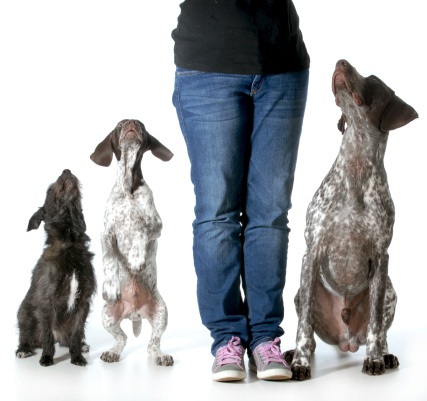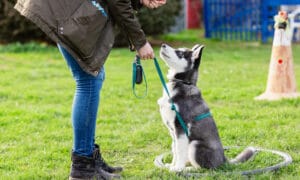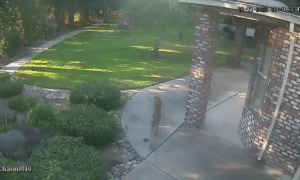“This post contains affiliate links, and I will be compensated if you make a purchase after clicking on my links.”

Hiring a trainer can make life with your dog a lot easier. But how do you know you’re choosing the right one? The first thing I’d like to say is that anyone can refer to himself or herself as a dog trainer. Unfortunately there is no regulation requiring certifications. This means that someone can see something on TV, think they’re good at it, and try to offer that service to people. Those are the “trainers” you want to avoid. Real dog training is very science based. Good trainers are aware of what they are doing, why they are doing it, and the consequences that come from doing it that way.
Overall there are two types of trainers, Positive and Traditional. (There are some traditional trainers that try to use some positive methods here and there but for simplicity reasons I am going to just refer to the two types.) Traditional training is a correction-based type of training. How it works is the trainer waits for the dog to make a mistake, and then the trainer punishes the dog. The punishment usually comes in the form of a collar correction, or a shock from a shock collar. Positive trainers do the opposite. Positive trainers focus on teaching the dog what to do and reinforcing the behavior. There is punishment involved, but it doesn’t cause pain or fear, which results in no side effects.
My recommendation is to look for someone that is certified and who doesn’t use aversive tools such as shock collars, choke chains, or pinch/prong collars. These “tools” can have side effects that they will not mention, and may not appear right away. If someone is certified, in theory, they have some experience. A certification is not everything but it shows that the individual put some time in to get it. My certification took me roughly two years to get. (CPDT-KA)
I recommend asking about the trainer’s experience. Things that I would be weary of are trainers that state that they’ve been doing it for a long time (8-20+ years.) This could be a very good thing, but it can also be a bad thing. Dog training has changed a lot in recent years and some trainers are stuck in their old ways and refuse to change. With what we know now, things can be accomplished easier and faster using up to date positive methods.
Another good thing to look for is a trainer that seems personable to you. This is someone that you will be working with, and you want to make sure your personalities don’t clash. Keep in mind that typically dogs like friendlier sounding people. So if you talk to the trainer on the phone and they don’t sound like they’re much fun, there is a good chance that your training experience won’t be much fun. Remember, training is about having fun and communicating with your dog.
There are a couple options to consider too when deciding how you would like to go about this training. Should you have a trainer come to you, or should you go to a training facility? Overall you will get more bang for your buck having a trainer come to you. It will cost you a bit more, but you will get the trainer’s undivided attention. Training classes can be good too because you will have to work through more distractions. One downfall to keep in mind about classes is that you won’t get the individual attention that you may need because of all the other students.
In closing I want to also mention to steer clear of any trainer that is giving guarantees, especially without ever meeting your dog. There is no guarantee in dog training. This is for two reasons. One, the dog is an animal. I never make guarantees, but I do tell people that I have a ton of success with just about every dog I work with. Two, the training takes lots of repetition. This means that this is something you will need to continue to work on even after the trainer is gone. There is no way to guarantee that the person will do what the trainer says once he or she is gone.
These are all just some things to keep in mind when hiring a trainer. Remember that having a dog and training it is a lifelong commitment. Stay positive and teach your dog in a similar way that you’d like to learn.
Kevin is a Certified Professional Dog Trainer through the Certification Council for Professional Dog Trainers (CCPDT.org) and is a Canine Good Citizen Evaluator through the American Kennel Club. He currently resides in Ohio with his dog, V, a six-year-old Shepherd/Lab mix, where he operates All Dogs Go To Kevin, LLC, specializing in helping build positive relationships between humans and their canine companions using clear communication, not pain and fear. For more training tips and tricks, and to meet his amazing dog, V, follow him on Facebook by clicking here.
Do you have a tough training question to ask? Click HERE to “Ask the Trainer!”
























Robin Myers
says:Pick a trainer that knows every dog is different and has different ways of learning so really you have to pick the best tool to use for that particular animal … Example a pit bull who has extreme anxiety and very hyper in the dog training world we call that adrenaline. Dog’s love it its like crack to a crack addict!!! However treats and clickers will not work pressure and release and most likely a prong …Used only by a professional and lightest of pressure !!! Just remember sometimes a trainer will go through 15 different methods to find which one best suits your dog’s learning needs… Just like children dog’s learn differently it is time for all dog trainers to realize this and stop putting there egos in between it’s beginning to feel like a religion … Positive training versus out the box training ( why is out of the box bad) ? The world is changing people which means so are people and their pet’s.